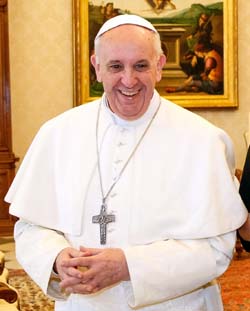Yes, Virginia, it would be great to see the article!
Bishop Lobinger’s contribution in Africa is described at pages 421-422 of chapter 12 (“SCCs Promote Family and Marriage Ministry in Eastern Africa”) of Maryknoll Fr. Joe Healy’s book, “Building the Church as Family of God: Evaluation of Small Christian Communities in Eastern Africa,” .
You described the current focus in Asia as follows:
“In places where there is priest shortage the leaders of the community keep the faith community alive and active by providing catechesis, Eucharist service and breaking of the Word every Sunday. They conduct Baptisms, witness marriages, give communion to the sick and when the priest is available the Eucharist is consecrated, and hears confessions, the bishop comes for Confirmation. The important fact is that the community is kept alive in the practice of the faith in the community.”
The experience in Africa appears to be quite similar. And in contrast to Benedict XVI, Pope Francis is cultivating just such local experiences of church, and speaks to these foundations in “Joy of the Gospel” (e.g. see #29).
I have a question for you, though:
In the Asian experience, how significant is the priestly consecration of the Eucharist for the faith of the community?
The reason I ask is because in my own community, in the United States, we have developed a “community led liturgy” where bread and wine is blessed (without pretense to consecration) by the whole community and distributed saying “remember Jesus” as opposed to “this is the body and blood of Christ”. Although we have ordained ministers most Sundays (from a pool of ten or fifteen priests in the Washington, DC, area), when we don’t have a priest the community led liturgy serves just as well to keep the community alive in the practice of the faith.
It seems to me that what Francis is doing to encourage evangelization from and by (rather than to and for) the grass roots is quite radical, and if the bishops are slow in responding to it with concrete proposals, then the bishops may end up following the lead of the flock “who strike out on new paths” (see #31 of “Joy of the Gospel”).
Some of these questions we have been talking about within the Strategy Team, but our strong sense was that the Advisors would likely have a much better feel for what was happening, and what could happen, at different places around the globe. Francis presents an extraordinary opportunity to pursue change in the Church by acting locally.
What you are saying about Asia, Virginia, is a good example.
You are quite right about Cardinal Gracias (and the entire Magisterium, including Pope Francis) saying, “don’t talk about women priests”. But the grass roots (the “sensus fidei”) have a mixed and richer voice on this question. In the end, this inequality will be rooted out, but much work still needs to done to lay an effective foundation for change. Although the bishops are not going to make proposals at the present time for women priests, it is still feasible to consider what can be done to lay an effective foundation.
